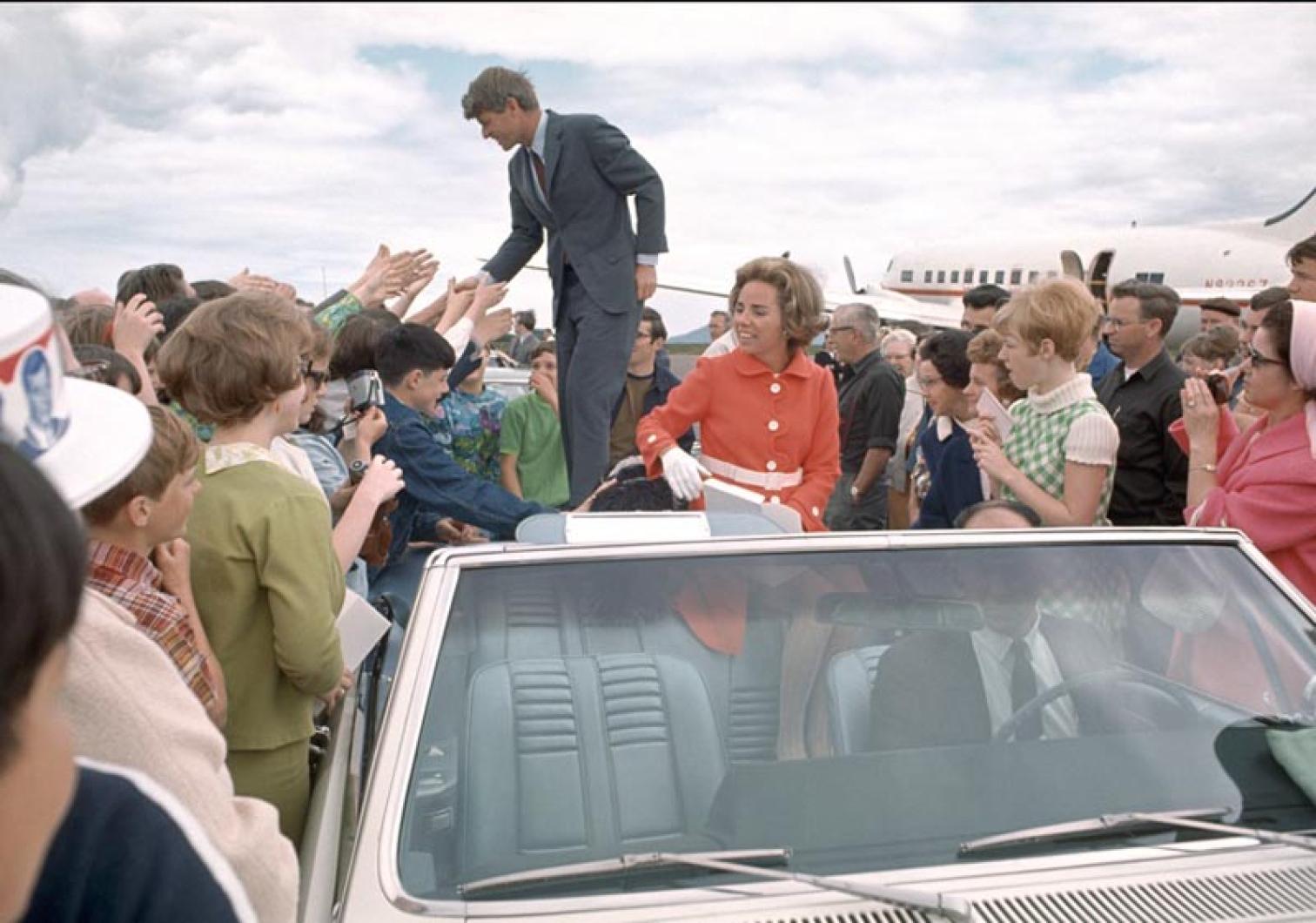On March 16, 1968, Robert F. Kennedy, senator from New York, announced his candidacy for the presidency. He was 42 years old.
“I run because I am convinced that this country is on a perilous course,” he said, “and because I have such strong feelings about what must be done, and I feel obliged to do all that I can.”
Few were better prepared for the nation’s highest office. Robert Kennedy had been U.S. Attorney General, top advisor to his brother, President John F. Kennedy, and was in his fourth year as a U.S. Senator. The power of his presidential ambition was forged in the tumult of the 1960s. He was changed by the massive civil rights protests ignited by southern students and the expansive democratic activism that followed. He was challenged by the racial reckoning centered in America’s cities, and he was driven by what he saw, heard and learned during travels across the country.
Kennedy was an activist senator. He participated in field hearings and investigations on the impact of anti-poverty programs. Shocked by the poverty and malnutrition he saw in the Mississippi Delta, he secured immediate federal aid and led in organizing hearings to focus national attention on intolerable conditions.
In New York, he joined with local activists to establish the Bedford Stuyvesant Restoration Corporation, a path-breaking effort to create a community run program for urban renewal. During a visit to South Africa, “he reset the moral compass,” student anti-apartheid activist Margaret Marshall recalled, “by simply talking about justice and freedom and dignity, words none of us had heard in it seemed like an eternity.”
In declaring his run for the Democratic nomination for president, Kennedy addressed his “profound differences” with President Lyndon Johnson, “over where we are heading and what we want to accomplish.” RFK sought to end America’s war in Vietnam and to advance the broader fight for new policies to meet “the inexcusable and ugly deprivation” in America’s cities, in Appalachia and Mississippi, and on American Indian reservations and to stem the growing divisions “between black and white, between rich and poor, between young and old.”
He spoke of his concern about the young people he had listened to and “their anger about the war they are sent to fight and the world they are about to inherit.”
Kennedy’s first campaign event was at Kansas State University, followed by the University of Kansas, then on to the University of Alabama, University of Georgia and Vanderbilt. Kennedy urged his young audiences to embrace the challenges facing the country. He often quoted his brother, reminding them, “You are the people ‘who have the least ties to the present and the greatest stake in the future.’”
In a rare mention of the likely Republican presidential candidate, Kennedy commented, “Richard Nixon represents the dark side of the American spirit.”
He ended his first campaign tour in California, at a rally of 5,000 people organized by the Watts Writers Workshop, established by young residents of the Watts area of Los Angeles in the aftermath of the 1965 rebellion.
RFK covered much of the country in a campaign that lasted barely 12 weeks. He believed that candidates for high office must “go before all Americans...not just those who agree with them...but all Americans who we must lead in the difficult years ahead.”
There was no need to “paper over differences on specific issues.” In a speech at the Indiana University School of Medicine, his plans for restructuring and expanding federally subsidized medical care for the poor drew boos and sparked debate. When a student demanded, “Where are you going to get all the money for these federally subsidized programs?” Kennedy shot back, “From you!”
He then leaned toward them and said: “You are the privileged ones here....It’s the poor who carry the major burden of the struggle in Vietnam.”
A young man stood and said, “A lot of us agree with what you are saying.”
On April 4, Kennedy was headed to Indianapolis when he learned that Martin Luther King Jr. had been assassinated in Memphis. A thousand people had gathered for the evening rally, organized by campaign worker and civil rights activist John Lewis. Few had heard about King’s death. When Kennedy broke the news to the crowd, it “moved through them like a wave,” Lewis recalled. “He had no notes. He spoke simply and honestly...completely extemporaneously...and the crowd hung on every word.”
“Martin Luther King dedicated his life to love and justice between fellow human beings...[and] died in the cause of that effort,” Kennedy began. “In this difficult day, in this difficult time for the United States, it is perhaps well to ask what kind of a nation we are and what direction we want to move in.”
Kennedy’s primary victory in California on June 4 made him the likely Democratic nominee before an assassin ended his life.
Reflecting on the loss of Bobby Kennedy, James Baldwin said, “He was somebody in the 20th century with enough passion and energy and patience.” Of RFK and his brother, Baldwin remarked, “They both had minds that could be reached.” He explained, “there’s some connection, there’s dialogue, there’s something happening that makes things possible.”
Robert Kennedy’s 1968 presidential campaign seized the moment created by the dynamic civic culture and political activism of the 1960s. The arc of his public life embraced the hard, collaborative, everyday work of democracy. His response to the rising polarization and despair of the late sixties resonates today. There was but one choice, he said: “To face our difficulties and strive to overcome them, or turn away, bringing repression, increasing human pain, and civil strife.”
Patricia Sullivan lives in Vineyard Haven. She is a professor of history at University of South Carolina, and author of Justice Rising: Robert Kennedy’s America in Black and White, published in 2021, and in paperback in 2024.




Comments (8)
Comments
Comment policy »